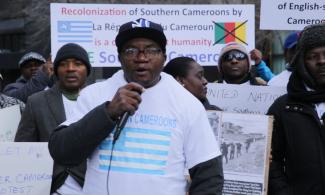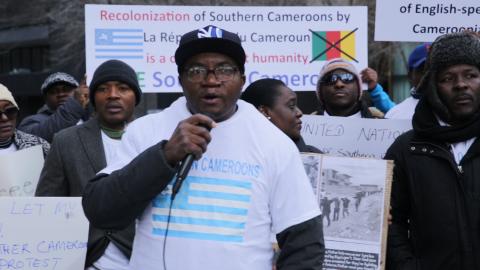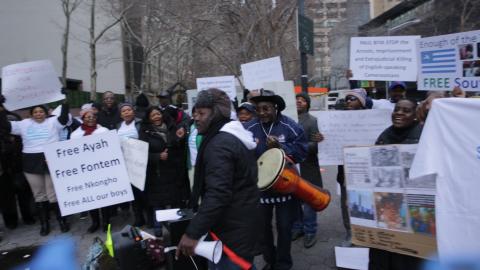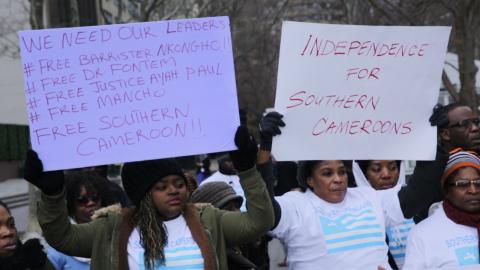
At a demonstration in front of the United Nations headquarters in New York, protesters organized under the aegis of the Cameroon Anglo-Saxon Community in New York (CAC-NY) demanded that the UN pressure the Cameroonian government to release imprisoned Anglophone Cameroonian activists and to grant the Anglophone regions a referendum on self-determination.
In response to the Cameroonian government’s ongoing crackdown on the country’s Anglophone population, Cameroonians in the diaspora demonstrated in cities across the United States and Western Europe over the weekend.
In the US, protesters demonstrated in New York, Washington, D.C., and Cleveland, while others protested at the French and Cameroonian consulates and embassies in France, Germany, and the Netherlands.
At a demonstration in front of the United Nations headquarters in New York, protesters organized under the aegis of the Cameroon Anglo-Saxon Community in New York (CAC-NY) demanded that the UN pressure the Cameroonian government to release imprisoned Anglophone Cameroonian activists and to grant the Anglophone regions a referendum on self-determination.
From Southern Cameroons to La République du Cameroun
While Anglophone protests against the Cameroonian government have only gained momentum in recent months, the roots of their struggle date back to the days of colonialism.
Southern Cameroons, encompassing the present-day Northwest and Southwest regions of Cameroon, was a part of the British Cameroons, while the remainder of present-day Cameroon was administered by the French and known as Cameroun.

In 1961, Southern Cameroons voted to become independent by federating with their newly independent Francophone neighbors, together forming the Federal Republic of Cameroon. Under this arrangement, both regions were granted considerable autonomy.
However, in 1972, Cameroonian President Ahmadou Ahidjo suspended the federal republic, establishing unitary rule and renaming the country the Republic of Cameroon (La République du Cameroun), effectively stripping away Anglophone autonomy.

The Anglophone Problem
Since the 1972 elimination of federalism, Anglophones, making up roughly 20 percent of the population of Cameroon, have faced systemic marginalization referred to as the “Anglophone problem.”
Most government and military officials are Francophones, while government documents are issued primarily in French, despite English being one of the country’s two official languages.
In 2016, protests against this marginalization sprung up across the Anglophone regions. The protests started as labor strikes organized by English-speaking lawyers and schoolteachers.
In October, lawyers began protesting government plans to scrap the English common law system in the Anglophone regions in favor of the French civil law system. Decrying the influx of Francophone teachers in their Anglophone schools, English-speaking schoolteachers joined the lawyers and declared a strike on November 22.

“Teachers were protesting the government sending French-speaking teachers into our [Southern Cameroonian] schools to teach our children who understand only English,” Jacob, a Southern Cameroonian activist, told our correspondent in New York. “In our courts, [the government] sent magistrates and judges who speak only French to pass judgment on citizens of our territory who don’t speak French.”
The strikes evolved into a broader social movement pushing for greater autonomy for the Anglophone regions. The demands range from a return to federalism to complete independence from Cameroon.
The government has responded with brutal suppression. Peaceful protesters have been arrested and detained in undisclosed locations, and the government recently shut down the Internet in the Anglophone regions. Key Anglophone Cameroonian activists, including lawyers and judges, have been arrested in an increasingly brutal crackdown on the minority Anglophone population.
“Right now, in Cameroon, you cannot talk because you’re going to be arrested,” a protester, Sabina, told our correspondent at the UN demonstration. “When people started talking, the president of the country, Paul Biya, had to cut off the Internet from the English-speaking part of Cameroon so that the world couldn’t see what was going on.”
She said that police, loyal to the Biya government, have been abducting Anglophone activists in the middle of the night and taking them away to unknown destinations.
Most notably, police arrested Barrister Agbor Balla Nkongho and Dr. Fontem Neba, leaders of the Cameroon Anglophone Civil Society Consortium, which was outlawed by the government.

Call To Action
The activists urged the UN, African Union, and the international community at large to investigate and put an end to the Cameroonian government’s crackdown on dissidents, to release all political prisoners, and to honor the right of self-determination by granting a referendum in former Southern Cameroons.
Rene Mbuli, one of the organizers of the protest, called on the UN to send a “fact-finding delegation” to Cameroon to investigate the government’s repressive tactics.
“It is time for the UN and African Union to intervene so they can sit at the dialogue table and see the way forward for Cameroon, because what we need is a lasting solution to this problem,” he said, adding that an international organization should monitor a referendum allowing Anglophone Cameroonians to determine their fate.
“There is a genocide going on in West Cameroon, and we need the international community to act now.”
